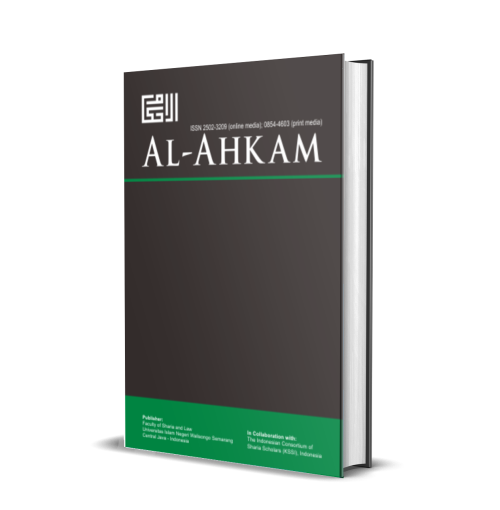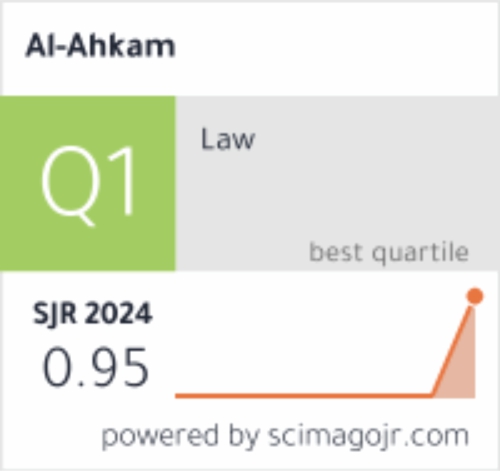Sharia in the Nigerian Constitutions: Examining the Constitutional Conferences and the Sharia Debates in the Drafts
DOI:
https://doi.org/10.21580/ahkam.2019.29.1.3158Keywords:
absolute-justice, constitution, democracy, equality, ḥudūd, Sharia courtAbstract
The paper examines the socio-ethnic and religious configuration of Nigeria and the nature of Sharia debates in the Nigeria constitutions of 1977/1978; 1988/1989 debates and Constitutional Conference of 1994/1995. The paper argues that the genesis of the Sharia debates can be traced to 1956. The Constitutional Conference of 1994/95 was not bedeviled by a serious acrimonious debate over the Sharia. However, the 1999 constitution brought a new dimension to the issue of the Sharia. To some extent, the enactment of Sharia law in Nigeria is a prime example of the relative success of Nigeria’s multi-state federalism in regards to governing diversity. Particularly the political autonomy to establish a Sharia Court of Appeal with civil jurisdiction on Islamic personal law. The paper concludes that the constitutionalization of the Sharia has subjected it to the vagaries of the political wind and made it easy prey to political fortune-seekers. Thus, the matters relating to religions should be removed from the future deliberative process in the country.
Downloads
References
Abun-Nasr, Jamil M. “The Recognition of Islamic Law in Nigeria as Customary Law.” In Law, Society, and National Identity in Africa, edited by Jamil M. Abun-Nasr, Ulrich Spellenberg, and Ulrike Wanitzek. Hamburg: H. Buske, 1990.
Agbiboa, Daniel E. “Federalism and Group-Based Inequalities in Nigeria.” Global Centre for Pluralism Accounting for Change in Diverse Societies, University of Pennsylvania, 2017.
Ali, Yusuf. “The Legal Status and Politics of Shariah in Nigeria.” Yusuf Ali & Co., n.d. https://yusufali.net/articles/The_Legal_Status_and_Politics_of_Shariah_in_Nigeria.pdf.
Anderson, J. N. D. Islamic Law in Africa. London: Frank Cass, 1955.
Aniagolu, Anthony Nnaemezie. The Making of the 1989 Constitution of Nigeria. Ibadan: Spectrum Books Limited, 1993.
Badamasiuy, Juwayriya, and Ahmed Adam Okene. “Shari’ah Implementation in a Democratic Nigeria: Historical Background and the Quest for Developmental Legality.” Journal of Politics and Law 4, no. 2 (2011): 144–52. https://www.academia.edu/890544/Shariah_Implementation
_in_Democratic_Nigeria_Historical_Background_and_The_Quest_for_Developmental_Legality.
Bello, Muhammad. “Shari’ah in the Lights of Nigerian Constitution.” In Perspectives in Islamic Law and Jurisprudence (A Publication of National Association of Muslim Law Students - NAMLAS), edited by M. Oloyede Adbul-Rahman, 63–71. Ibadan: NAMLAS, 2001.
Federal Government. Report of the Constitutional Conference Containing the Draft Constitution. 1st ed. Lagos: Federal Government Press, 1995.
Gbadamasi, G. O. “The Growth of Islam Among the Yorubas (1841-1908).” University of Ibadan, 1968.
“Gongola State of Nigeria Executive Council.” en.wikipedia.org, n.d. https://en.wikipedia.org/wiki/Gongola_State.
Harbold, Dell Gillette &, and William Henry Hitchner. Modern Government: A Survey of Political Science. New York: Dodd, Mead & Company, 1966.
Igbuzor, Otive. “Nigeria’s Experience in Managing the Challenges of Ethnic and Religious Diversity through Constitutional Provisions,” n.d. http://www.idea.int/asia_pacific/myanmar/up/oad/burma_report .
Jones, Lindsay, ed. “History of Shariah.” Encyclopedia of Religion. USA: Macmillan Reference, 2004.
Karibi-Whyte, A. G. History and Sources of Nigerian Criminal Law. Ibadan: Spectrum Books Limited, 1993.
Khalāf, ’Abd al-Wahhāb. ’Ilm Al-Fiqh. Cairo: Matba’at al-Nasr, 1957.
Nwabueze, Ben. “Freedom of Religion: The Religious Neutrality of the State under the Constitution and the Sharia Controversy.” Bulletin of Ecumenical Theology 13 (2001).
Nwabueze, Ben O. Ideas and Facts in Constitution Making. Ibadan: Spectrum Books Limited, 1993.
Okunola, Muri. “The Relevance of Sharia to Nigeria.” In Islamic Law in Nigeria (Application & Teaching), edited by Syed Khalid Rashid. Lagos: Islamic Publications Bureau, 1986.
Oloyede, Is-haq Olanrewaju. “Theologising the Mundane, Politicising the Divine: The Cross-Currents of Law, Religion and Ppolitics in Nigeria.” African Human Right Law Journal 14, no. 1 (2014): 178–202. http://www.ahrlj.up.ac.za/issues/2014/volume-14-no-1-2014/41-issues/volume-14-no-1-2014/435-theologising-the-mundane-politicising-the-divine-the-cross-currents-of-law-religion-and-politics-in-nigeria.
Omoruyi, Omo. “An Appeal to President Olusegun Obasanjo: Nigeria: Neither an Islamic nor a Christian Country.” Nigeriaworld, 2001. https://nigeriaworld.com/feature/publication/omoruyi/0307001.html
Oraegbunam, Ikenga K. E. “Islamic Criminal Law and Constitutionalism in Nigeria: Any Lessons from Turkey?” Journal of Law, Policy and Globalization 33 (2015): 25–45. https://www.iiste.org/Journals/index.php/JLPG/article/view/19335.
Pepinsky, Thomas B., R. William Liddle, and Saiful Mujani. “Testing Islam’s Political Advantage: Evidence from Indonesia.” American Journal of Political Science 56, no. 3 (2012): 584–600. https://doi.org/10.1111/j.1540-5907.2011.00570.x.
Rashid, S. Khalid. “Introduction.” In Islamic Law in Nigeria (Application & Teaching), edited by Syed khalid Rashid. Lagos: Islamic Publications Bureau, 1986.
Suberu, R. T. Ethnic Minority Conflicts and Governance in Nigeria. Ibadan: Spectrum Books Limited, 1997.
Sulaiman, Ibrahim R. “The Shari’ah and the Constitution.” In Islamic Law in Nigeria (Application & Teaching), edited by Syed Khalid Rashid. Lagos: Islamic Publications Bureau, 1986.
Thaib, Lukman. “Concept of Political Authority in the Islamic Political Thought.” International Journal of Humanities and Social Science Invention 1, no. 1 (2012): 12–19. www.ijhssi.org.
Yadudu, Auwalu Hamisu. “Dialogue of the Deaf: The Shari’ah Debate in Nigeria.” In A Digest of Islamic Law and Jurisprudence in Nigeria. A Publication of National Association of Muslim Law Students (NAMLAS), edited by Zakariyau Husseini. Auchi: Darun- Nur, 2003.
Yadudu, Auwalu Hamisu. “The Prospect for Shari’a in Nigeria.” In Islam in Nigeria, edited by Nura Alkali, 36–58. Ibadan: Spectrum Books Limited, 1993.
Downloads
Published
How to Cite
Issue
Section
License
By submitting an article to the journal, the author(s) agree to transfer the published article's copyright to the journal, which will act as the publisher. This means the journal will have the right to publish the article in various forms, including reprints. The journal will maintain the publishing rights to the published articles.
In line with the license, authors and third parties (readers, researchers, and others) are allowed to share and adapt the material. In addition, the material must be given appropriate credit, provided with a link to the license, and indicated if changes were made. If authors remix, transform or build upon the material, authors must distribute their contributions under the same license as the original.




